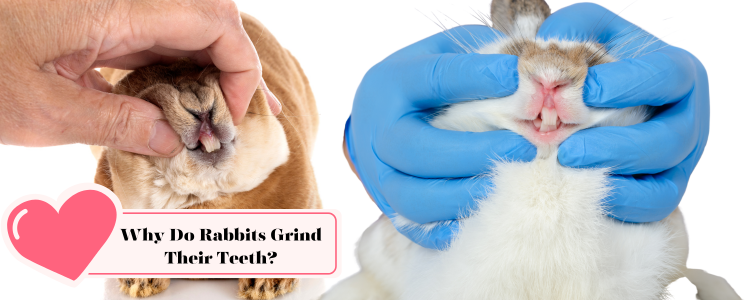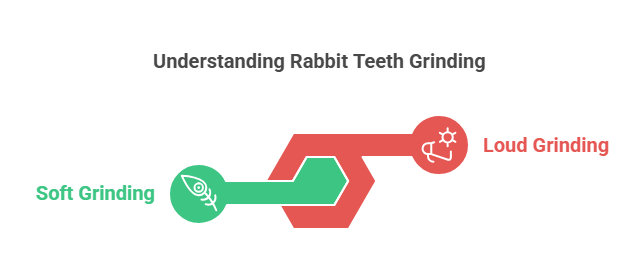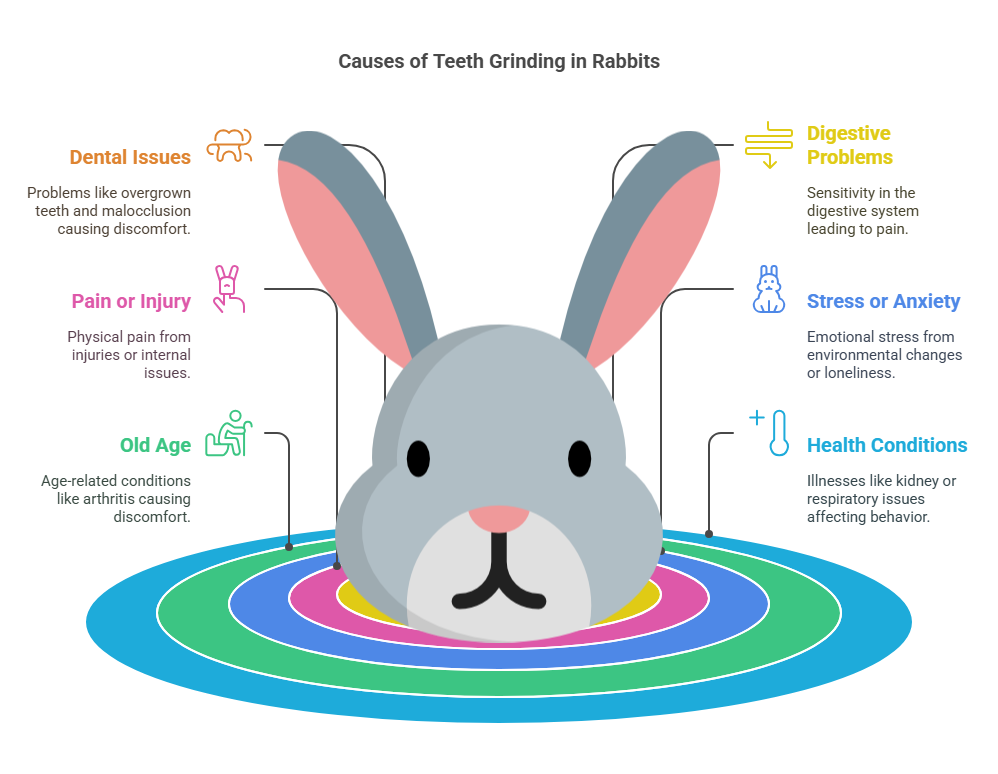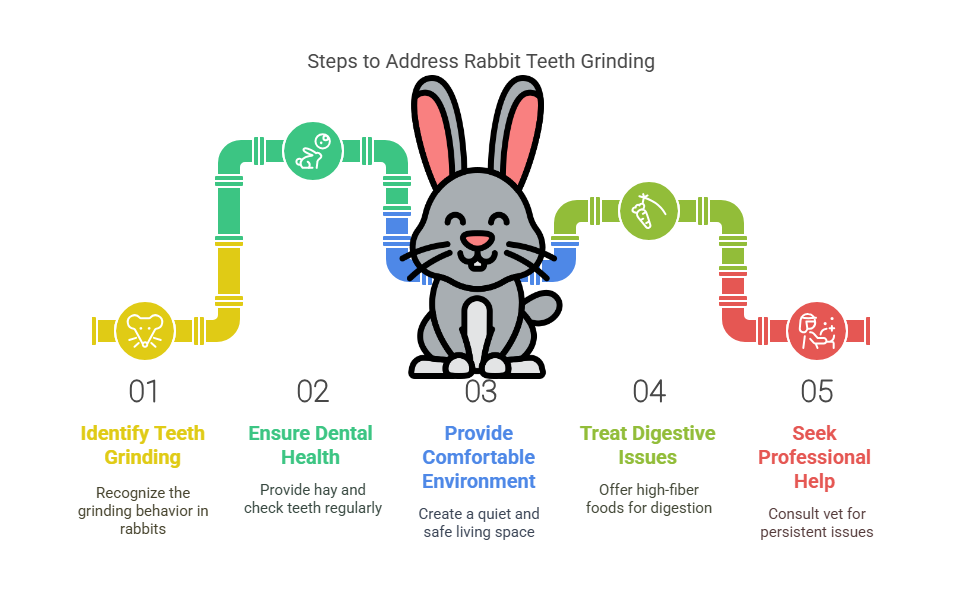Rabbits are adorable creatures, known for their soft fur, twitching noses, and gentle nature. As a pet owner, it’s common to notice certain behaviors, some of which might leave you puzzled. One such behavior is teeth grinding. It might seem like a harmless, quirky habit, but it’s actually a significant sign of a rabbit’s health and emotional state. So, why do rabbits grind their teeth?
Teeth grinding, or bruxism, in rabbits can be caused by a range of factors, both physical and emotional. Understanding these causes can help you provide better care for your furry friend and ensure they are living a happy and healthy life. In this article, we’ll explore the different reasons why rabbits grind their teeth and what it could mean for your pet’s well-being.
Dr. Lisa Freeman, a veterinarian with extensive experience in rabbit care, explains:
“Rabbits often grind their teeth when they’re in pain or under stress. It’s essential to observe your rabbit closely and consult a vet if you notice anything unusual.”
What is Teeth Grinding in Rabbits?
Teeth grinding is the sound a rabbit makes when they rub their teeth together. There are two main types of teeth grinding in rabbits: soft grinding and loud grinding. Soft grinding is a sign of contentment, while loud grinding is usually a cause for concern.
According to the House Rabbit Society, dental issues are one of the most common health problems in pet rabbits, affecting up to 80% of pet rabbits by the age of 3. Regular dental check-ups can help detect these issues early and improve your rabbit’s quality of life.
-
Soft Grinding: This is often referred to as “purring.” It’s a sign that your rabbit is relaxed and comfortable. You might hear this sound when they’re being petted or enjoying their environment.
-
Loud Grinding: This kind of grinding is associated with pain or distress. It can be a sign that your rabbit is experiencing discomfort due to dental issues, digestive problems, or emotional stress.
Knowing the difference between the two can help you determine if your rabbit is simply being affectionate or if they need medical attention.
Why Do Rabbits Grind Their Teeth? The Causes
There are several reasons why a rabbit might grind their teeth, ranging from physical discomfort to emotional stress. Here’s a closer look at the common causes:
1. Dental Issues
Rabbits’ teeth grow continuously throughout their lives. In the wild, their diet consists of fibrous plants that help wear down their teeth naturally. However, pet rabbits often don’t get the same variety of food, leading to dental problems.
-
Overgrown Teeth: If a rabbit’s teeth grow too long, it can cause pain when chewing or grinding. Overgrown teeth can lead to sores in the mouth, difficulty eating, and even abscesses.
-
Malocclusion: This is a condition where a rabbit’s teeth do not align properly. It can lead to severe discomfort and pain, causing the rabbit to grind their teeth.
-
Tooth Infections: If a rabbit has an infection in their teeth or gums, the pain can cause them to grind their teeth. Infections can be serious and may require veterinary care.
2. Digestive Problems
Rabbits are known for having sensitive digestive systems. Any issues in the gastrointestinal tract can cause pain or discomfort, which may lead to teeth grinding.
-
Bloat: Bloat, or gastrointestinal stasis, is a condition where the rabbit’s stomach or intestines become distended with gas. It can cause extreme pain and often results in teeth grinding.
-
Cecal Compaction: Rabbits produce a special type of feces called cecal pellets. If these become compacted or stuck in the digestive tract, it can cause pain, leading to teeth grinding.
-
Gas or Colic: Intestinal gas or colic can also cause a rabbit to grind their teeth as they experience discomfort in their abdomen.
3. Pain or Injury
Rabbits will grind their teeth when they’re in pain. This could be due to injury, illness, or internal discomfort. They might have sprained a paw, hurt their back, or even have internal injuries. If you notice loud teeth grinding accompanied by signs of lethargy or refusal to eat, it’s a good idea to consult a veterinarian.
4. Stress or Anxiety
Rabbits can experience stress, just like any other pet. A sudden change in their environment, a new pet in the house, or a loud noise can cause anxiety and lead to teeth grinding. This is typically softer grinding and can be accompanied by other stress behaviors, such as hiding or aggression.
-
Environmental Changes: A move to a new cage, a new home, or changes in their daily routine can stress a rabbit.
-
Separation Anxiety: Rabbits are social animals. If left alone for too long, they may experience separation anxiety, leading to teeth grinding and other behavioral changes.
5. Old Age
As rabbits get older, they may suffer from age-related conditions such as arthritis, which can cause discomfort. This discomfort might lead them to grind their teeth, especially if they are having trouble moving around or eating.
6. Health Conditions
There are several health conditions that can cause rabbits to grind their teeth. Some of these include kidney disease, urinary tract infections, or respiratory infections. It’s essential to monitor your rabbit’s overall health and consult with a vet if you notice unusual behavior, such as excessive teeth grinding.
How to Help a Rabbit That Grinds Its Teeth
If your rabbit is grinding their teeth, it’s important to pay attention to the type of grinding and the context. Here are some steps to take based on the cause:
1. Ensure Dental Health
Provide your rabbit with plenty of hay, vegetables, and chew toys to promote dental health. Regularly check your rabbit’s teeth for signs of overgrowth or infection. If you notice any issues, schedule a vet visit for a professional dental check-up.
2. Provide a Comfortable Environment
Make sure your rabbit’s living area is quiet, clean, and safe. Avoid loud noises and sudden changes in their environment. Offer plenty of hiding spots and toys to help alleviate stress.
3. Treat Digestive Issues
Ensure your rabbit has a healthy diet full of high-fiber foods to promote good digestion. Fresh hay, vegetables, and water are essential. If your rabbit shows signs of gastrointestinal distress, such as bloating or a lack of appetite, contact your vet immediately.
4. Seek Professional Help
If you notice persistent or loud teeth grinding, or if it’s accompanied by other signs of illness, such as weight loss, lethargy, or changes in behavior, consult your veterinarian. They can diagnose any underlying health issues and provide appropriate treatment.
FAQs About Rabbits Grinding Their Teeth
-
Is teeth grinding normal for rabbits? Soft, gentle teeth grinding is usually normal and indicates that your rabbit is content. However, loud grinding can be a sign of pain or distress and requires attention.
-
How can I tell if my rabbit is in pain from grinding their teeth? If your rabbit is grinding their teeth loudly and showing signs like loss of appetite, lethargy, or difficulty moving, it could be in pain and needs veterinary attention.
-
What can I do if my rabbit has overgrown teeth? If your rabbit’s teeth are overgrown, consult with your vet. They may need to trim the teeth or address any underlying issues.
-
Can stress cause a rabbit to grind its teeth? Yes, stress from changes in the environment, routine, or social interactions can cause a rabbit to grind its teeth.
-
How can I prevent my rabbit from grinding its teeth? Ensure your rabbit has a healthy diet, plenty of space to roam, and a calm environment. Regular veterinary check-ups can also help maintain their overall health.
By understanding the reasons behind teeth grinding, you can help your rabbit stay healthy and happy. Whether it’s a sign of contentment or a cry for help, being attentive to your rabbit’s behavior and needs is key to ensuring they thrive in your care.





